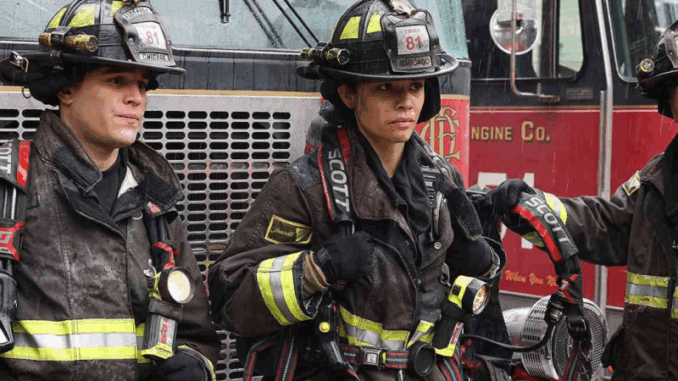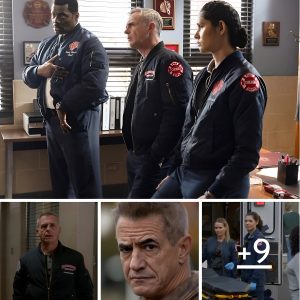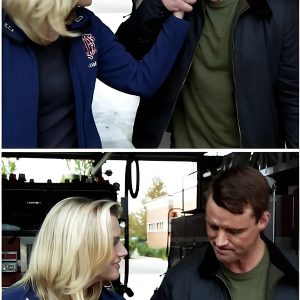A Clash of Worlds: When Firehouse 51 Found Itself at Odds with Intelligence’s Leader
For fans who jumped into the One Chicago universe later in its run, the initially antagonistic relationship between Lieutenant Matthew Casey (Jesse Spencer) and Detective Sergeant Hank Voight (Jason Beghe) in Chicago Fire Season 1 might seem like a distant memory. However, the early friction between Firehouse 51 and the head of the Intelligence Unit was a significant plot point, fueled by Voight’s decidedly questionable methods and outright illegal actions. The question isn’t just whether Voight bent the rules, but whether he truly operated as a dirty cop in those formative episodes, and why that put him squarely in the crosshairs of Casey and his firehouse family.
Hank Voight’s introduction into the Chicago Fire narrative was far from heroic. He wasn’t presented as a morally ambiguous but ultimately effective cop; instead, he appeared as a man willing to cross any line to protect his own, even if it meant endangering or intimidating those sworn to uphold the law. This initial portrayal laid the groundwork for the deep-seated distrust and outright hatred that Firehouse 51, particularly Casey, harbored towards him.
The Incident That Ignited the Fire: Voight’s Son and the DUI
The catalyst for the intense conflict between Casey and Voight was a car accident in the third episode of Season 1, “Professional Courtesy.” Firehouse 51 responded to a serious collision where the driver, Justin Voight (Josh Segarra), Hank’s son, was clearly intoxicated. Casey, a man with a strong sense of justice and adherence to the law, insisted that Justin be held accountable, especially given that the passenger in the other car was left paralyzed.
This seemingly straightforward case of drunk driving unleashed Voight’s darker side. He didn’t simply try to use his influence within the police department; instead, he resorted to bribery, offering Chief Boden a brand new television set for the firehouse in exchange for making the incident “disappear.” When that failed, Voight escalated his tactics to outright intimidation and threats, targeting not only Casey but also his then-fiancée, Dr. Hallie Thomas (Teri Reeves).
Bribery, Threats, and Planting Evidence: Voight’s Playbook of Illegality
Voight’s actions in Season 1 went far beyond a father trying to protect his son through legal means. His attempts to obstruct justice included:
- Bribery: Offering material goods to influence official action.
- Verbal Threats: Intimidating Casey and his colleagues to coerce them into silence.
- Physical Intimidation: Using his position and implied power to instill fear.
- Attempted Harm: There were strong implications that Voight was willing to have Casey physically harmed to prevent him from testifying against Justin.
- Planting Evidence: Later in the season, Voight orchestrated a drug trafficking setup to frame Casey and Hallie, showcasing a blatant disregard for their lives and careers.
These actions clearly paint a picture of a man operating outside the bounds of the law, using his authority and connections for personal gain and to evade justice for his son. By definition, this aligns with the behavior of a dirty cop.
Casey’s Unwavering Moral Compass: The Antithesis of Voight
Lieutenant Matthew Casey, in contrast to Voight, was consistently portrayed as a man of integrity and strong moral principles. His dedication to doing the right thing, even when facing significant pressure and danger, put him directly at odds with Voight’s corrupt methods. Casey’s refusal to be intimidated or swayed by Voight’s threats stemmed from his deep-seated belief in justice and accountability.
Firehouse 51, as a whole, largely sided with Casey in this conflict. While some members might have been wary of directly confronting a powerful figure like Voight, their loyalty to Casey and their shared commitment to upholding the law created a unified front against his illegal actions. The firehouse represented a sense of community and ethical conduct that stood in stark opposition to Voight’s self-serving corruption.
The Seeds of a Complicated Future: The Dawn of the One Chicago Universe
While Season 1 firmly established Voight as an antagonist to Casey and Firehouse 51, the seeds of their future, albeit complicated, alliance were also sown. Detective Antonio Dawson (Jon Seda), a relatively more by-the-book cop within Voight’s precinct, played a crucial role in eventually arresting Voight in a sting operation orchestrated to protect Casey and Hallie.
Later, the narrative would evolve, particularly with the spin-off Chicago P.D., which offered a more nuanced perspective on Voight’s character. The show often justified his morally ambiguous methods as necessary to combat more significant threats and protect the innocent. However, it’s crucial to remember his initial portrayal in Chicago Fire Season 1, where his actions were undeniably those of a dirty cop operating outside the law for personal gain.
Conclusion: Voight’s Hands Were Dirty, and Firehouse 51 Knew It
In the early episodes of Chicago Fire, the animosity between Matt Casey and Hank Voight was not a simple clash of personalities. It was rooted in Voight’s blatant corruption and his willingness to use illegal tactics, including bribery, threats, and framing, to protect his son from the consequences of his actions. Firehouse 51, led by Casey’s strong moral compass, stood firmly against this abuse of power.
While Voight’s character would later undergo significant development and even earn a degree of grudging respect from some members of Firehouse 51, his actions in Chicago Fire Season 1 unequivocally labeled him as a dirty cop in their eyes. Their initial hatred was a justified response to his blatant disregard for the law and the danger he posed to their own lives and well-being. The early conflict between these two iconic figures laid the foundation for the complex and often morally gray landscape of the One Chicago universe.





